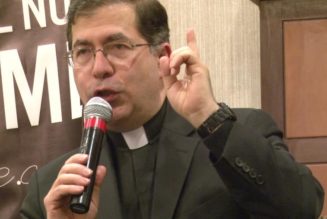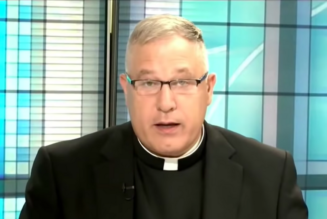
Holy Week and Divine Mercy Sunday, present everyone with particular plenary indulgences that everyone has the opportunity to receive. Here’s how to gain them for yourselves, your loved ones in purgatory, and possibly even for some forgotten soul there.
The plenary indulgences that we can receive on every day of Holy Week actually are of two kinds. Certain ones are specific to Holy Week itself. Certain ones we can actually gain anytime, including the Easter Octave.
They’re listed in the Norms and Grants in the official Manual of Indulgences, fourth edition (English edition 2006) the latest and most up-to-date edition of the Manual, or Enchiridion Indulgentiarum, the one that replaces all others.
First, let’s look at the plenary indulgences specific to Holy Week. Next, we’ll look at those also available during Holy Week plus any time of the year. Then we’ll review the basic mandatory conditions that must be fulfilled for any plenary indulgence. Then we’ll check on “extras.”
Holy Week Plenary Indulgences
These are the specific works listed in the Grants in the Manual of Indulgences:
Holy Thursday. “A plenary indulgence is granted to the faithful who piously recite the verses of the Tantum ergo after the Mass of the Lord’s Supper on Holy Thursday during the solemn reposition of the Most Blessed Sacrament.”
Good Friday brings two opportunities. “A plenary indulgence is granted to the faithful who
1. Devoutly assist at the adoration of the Cross in the solemn liturgical action of Good Friday; or
2. Personally make the pious Way of the Cross, or devoutly unite themselves to the Way of the Cross while it is being led by the Supreme Pontiff and broadcast live on television or radio.”
Most every parish conducts Stations of the Cross for parishioners on Good Friday.
On Holy Saturday, Easter Vigil brings another opportunity. “A plenary indulgence is granted to the faithful who, at the celebration of the Easter Vigil (or on the anniversary of their own Baptism), renew their baptismal vows in any legitimately approved formula.”
The Easter Vigil includes renewal of baptismal vows.
Early in Holy Week
On Monday, Tuesday and Wednesday of Holy Week we should try to make Mass and receive Holy Communion. That is a “must” because receiving Holy Communion is one of the basic conditions for any plenary indulgence. Here, we consider those certain plenary indulgences which can be gained all year. These are the ones we can obtain on Monday through Wednesday as long as we fulfill the basic conditions (more on them later) and also perform the work required.
The Manual of Indulgences makes this very clear to us: “Deserving of special mention are grants pertaining to these works by any one of which the faithful can obtain a plenary indulgence each day of the year,” always remembering “a plenary indulgence can be acquired no more than once a day.” The Manual lists them as four:
— Adoration of the Blessed Sacrament for at least one half hour
—The pious exercise of the Way of the Cross
— Recitation of the Marian rosary or of the hymn Akathistos, in church or an oratory; or in a family, a religious community, or a sodality of the faithful or, in general, when several of the faithful are gathered for any good purpose
— The devout reading or listening to the Sacred Scriptures for at least a half an hour
Any one of these per day, Monday through Wednesday — plus Palm Sunday too — can obtain a plenary indulgence for us for ourselves or to apply to a soul in purgatory.
Basic Mandatory Conditions
“In general, the gaining of indulgences requires certain prescribed conditions and the performance of certain prescribed works,” reminded the Apostolic Penitentiary in 2000. The conditions are not many and are not at all difficult.
First, though, the office initially repeated the definition. “An indulgence is a remission before God of the temporal punishment due to sins whose guilt has already been forgiven, which the faithful Christian who is duly disposed gains under certain prescribed conditions through the action of the Church…” The office explained, “Indulgences can always be applied either to oneself or to the souls of the deceased, but they cannot be applied to other persons living on earth.”
The Manual of Indulgences gives these basics conditions for any indulgence, plenary or partial. The person seeking the indulgence must be baptized, not excommunicated, and in the state of grace at least at the time the prescribed work is completed.
The Norms remind of another simple essential: we need to have the general intention of wanting to gain the indulgence as well as carrying out the specific works required, according to the sense of the Grant. That’s simple enough.
This next is important. The Norm states, “To gain a plenary indulgence, in addition to excluding all attachment to sin, even venial sin, it is necessary to perform the indulgenced work and fulfill the following three conditions: sacramental confession, Eucharistic Communion, and prayer for the intention of the Sovereign Pontiff.”
For simplicity sake, let’s review these simple essentials are presented by the office of the Apostolic Penitentiary in their words:
“To gain indulgences, whether plenary or partial, it is necessary that the faithful be in the state of grace at least at the time the indulgenced work is completed.”
“A plenary indulgence can be gained only once a day. In order to obtain it, the faithful must, in addition to being in the state of grace:
— have the interior disposition of complete detachment from sin, even venial sin;
— have sacramentally confessed their sins;
— receive the Holy Eucharist (it is certainly better to receive it while participating in Holy Mass, but for the indulgence only Holy Communion is required);
— pray for the intentions of the Supreme Pontiff.”
The Apostolic Penitentiary in 2000 clarified that One Our Father and one Hail Mary is suggested for the Holy Father’s intentions thought the faithful can chose what prayer, and one sacramental Confession suffices for several plenary indulgences.
As for the Stations of the Cross for a plenary indulgence, the manual details, “The pious exercise must be made before stations of the Way of the Cross legitimately erected…According to the common custom, the pious exercise consists of 14 devotional readings, to which some vocal prayers are added. To make the Way of the Cross, however, it is sufficient to meditate devoutly on the Lord’s Passion and Death, and therefore reflection on the particular mysteries of the individual stations in not necessary…Progression from one station to the next is required.” But if we’re making it publicly such as done for a parish, only the one conducting it has to move while we remain in our place.
Extras and Divine Mercy Sunday
We should not stop after Holy Week. Why not continue during the Easter Octave, from Easter Sunday through Divine Mercy Sunday? Monday through Saturday we have those four everyday possibilities for a plenary indulgence. Go to Mass, receive Communion. Then spend time in adoration before the Blessed Sacrament. Pray the Rosary in church. Or with family or as listed above. Read Sacred Scripture for at least half an hour. Your choice.
Then Divine Mercy Sunday has a plenary indulgence of its own.
Through private revelation to St. Faustina, Jesus revealed, I want to grant a complete pardon to the souls that will go to Confession and receive Holy Communion on the Feast of My mercy (1109). The soul that will go to Confession and receive Holy Communion will obtain complete forgiveness of sins and punishment (699). And we must trust in Divine Mercy.
According to Robert Stackpole, the director of the John Paul II Institute of Divine Mercy, an apostolate of the Marian Fathers of the Immaculate Conception, “The most special grace promised by our Lord for Mercy Sunday is nothing less than the equivalent of a complete renewal of baptismal grace in the soul: “complete forgiveness (remission) of sins and punishment.” (more explanation here)
St. John Paul II not only declared Divine Mercy Sunday a universal feast of the Church, but in 2002 he also attached a plenary indulgence to it. This made private revelation’s promise “official” as “the Holy See institutionalized the Promise in the form of an Indulgence.”
First there are the usual or standard three conditions of sacramental confession, Eucharistic Communion, and prayer for the intentions of Supreme Pontiff.
Next, the specific conditions or “work” required: “On Divine Mercy Sunday
· in any church or chapel, in a spirit that is completely detached from the affection for a sin, even a venial sin, take part in the prayers and devotions held in honor of Divine Mercy or, in the presence of the Blessed Sacrament exposed or reserved in the tabernacle, recite the Our Father and the Creed, adding a devout prayer to the merciful Lord Jesus (e.g. “Merciful Jesus, I trust in you!”).”
For those unable to fulfill these conditions, there are explanations of what they can do for indulgences.
From Holy Week through Divine Mercy Sunday — and beyond — we should try not to miss out on these indulgences for ourselves or for any soul in purgatory who might get the chance to reach heaven in time for Easter and well beyond.









